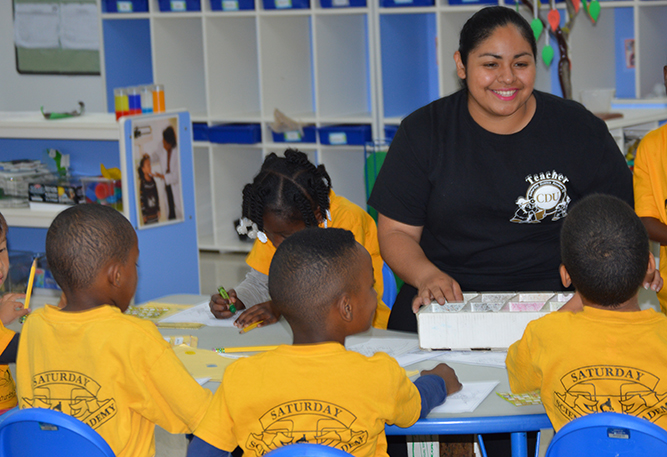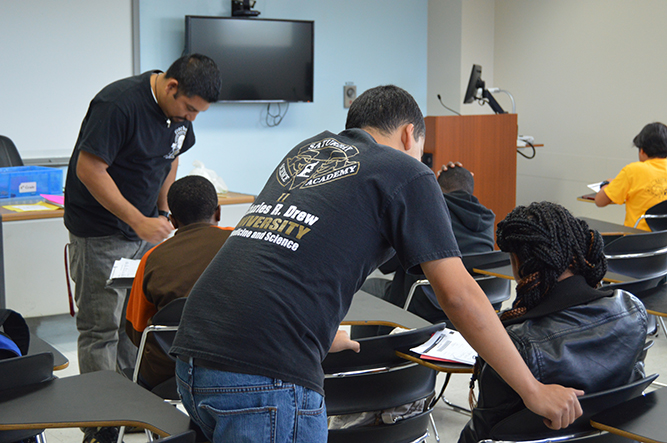
Ten kindergarteners bounce up and down and cry out, “What are we going to plant? What are we going to plant?” as California State University, Dominguez Hills (CSUDH) biology major Jessica Munoz-Mora leads them to a small vegetable garden on the campus of Charles Drew University of Medicine and Science.
In a nearby building, middle and high school students sit in classrooms and work out complex math problems with help from CSUDH biology majors Hector Meza-Lopez and Ronald Gonzalez and biochemistry major Amarachi Okafor before they move on to lessons in the life and physical sciences.
It’s a Saturday, and these youth–and their college-aged teachers– could be enjoying a sunny day with their friends or just doing nothing after a long week of school, but instead they’re at Charles Drew’s Saturday Science Academy (SSA).
As Munoz-Mora’s young charges make their way to their designed assembly area one Saturday morning in April, she greets them by name and with a cheerful “Good Morning.” They then walk in single file to their classroom, where she and two other teachers pass out a worksheet for them to color. She sits down beside them and engages them with questions about plants before taking them to the garden.
Through her experience in the academy, she’s learning how to connect with young children, which will be helpful for her future career plans.
“I want to go into pediatrics,” she said. “I absolutely love working with pre-k and kindergarten children. It’s a lot of work, but so much fun.”
SSA is a year-round program with three eight-week sessions during the school year and a four-week summer course, the Saturday Science Academy seeks to strengthen math and science knowledge among African American and Latino students who reside in the South Los Angeles communities surrounding the medical school. The ultimate aim of the academy is to inspire the youth toward degrees and careers in science, technology, engineering or science, STEM fields in which minority populations have been traditionally underrepresented.
Munoz-Mora has been volunteering at SSA for the past two years as a member of the Pre-Health Society student organization. She is one of approximately 20 CSUDH students, mostly Pre-Health Society members, who teach at the academy along with students from UCLA, UC Irvine, Pepperdine University, Mount St. Mary, Cal State Northridge, and Charles Drew University.
“We couldn’t do it without our college students,” said SSA director Lorraine Grey of her teachers, adding in a compliment to the CSUDH students. “CSUDH is really strong with Saturday Science Academy.”
This is Anahi Soriano and Felipe Ochoa’s first year volunteering in SSA. Soriano, a second-year freshman majoring in physical therapy, works with pre-K students, and Ochoa, a graduating senior majoring in biology, leads a middle school class. They agree, its feels good to give back.
“The most gratifying thing is interacting with the kids, knowing that you are helping them out and giving back to those who need it the most,” said Ochoa, who said he sees himself in the students. “I knew I struggled in school. It would have been wonderful to have someone to help ease me through it. It’s really good feeling to help them.”
For biochemistry graduating senior and Pre-Health Society president Aldo Alvarez, one challenge of volunteering at SSA has been finding ways to motivate a roomful of young students to want to learn math and science on a Saturday when they could be doing anything else.
“We have to use examples that play on their interest, or we have them teach with us. They learn as they teach others, and it has worked out really well,” said Alvarez. “Students usually show us their report cards, even though they don’t have to, when they are doing poorly in a certain class. Seeing them show us their grades again when they improve, with smiles on their faces, has to be the biggest reward.”

And just as the young students have improved from their participation in the science academy, the CSUDH student volunteers noticed a change in their own studies.
“They ask really intriguing questions. It makes you think about things more,” said Meza-Lopez
He’s found that topics that arise on Saturday sometimes come up in his classes, and vice versa. That reinforcement is having an impact.
“It shows in my grades,” said Meza-Lopez, who will be graduating in the fall and wants to go into dentistry.
“You’ve got to learn this stuff in order to teach it,” said Gonzalez. “When you see puzzled faces at first and talk them through [a problem], and then they see the lightbulb light up, that’s nice.”
Gonzalez said it’s been very rewarding to volunteer at the Saturday Science Academy. He feels like he’s making a difference because out in the community he doesn’t see enough underrepresented minorities serving as role models in the sciences.
“That motivates me,” he said.